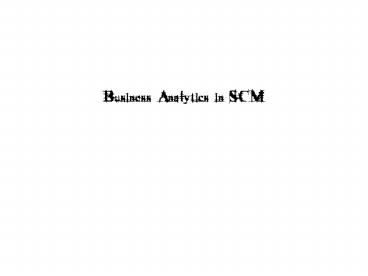Business Analytics in SCM - PowerPoint PPT Presentation
1 / 36
Title:
Business Analytics in SCM
Description:
Business Analytics Defined. Techniques and Tools. Examples. Customers. Suppliers ... Advanced Analytics. Flow Diagram of Hilbert Engine & Software Application ... – PowerPoint PPT presentation
Number of Views:147
Avg rating:3.0/5.0
Title: Business Analytics in SCM
1
Business Analytics in SCM
2
Agenda
- Business Analytics Defined
- Techniques and Tools
- Examples
3
(No Transcript)
4
(No Transcript)
5
Companys Environment
Customers Environment
Suppliers Environment
Suppliers
Customer and Market Intelligence
Supplier and Market Intelligence
Customers
Company
Business Intelligence
BI/MI is the convergence of all three information
gathering, analysis, dissemination and response)
activities.
6
Analytics
Scenario modeling root cause analysis
Enterprise Performance
Optimization
Predictive modeling
Descriptive modeling
Reports OLAP
Data Cleansing Classification
ROI
Raw data
Data
Information
Knowledge
Intelligence
7
Analytics
- Data-driven insight for better decisions.
- predictive analytics
- descriptive modeling,
- data mining,
- text mining,
- forecasting,
- optimization,
- simulation,
- experimental design.
- Collection, classification, analysis and
interpretation of data to reveal patterns,
anomalies, key variables and relationships,
leading ultimately to new insights for guided
decision making.
8
Agenda
- Techniques and Tools
9
Optimization
- Linear, integer, nonlinear and network
programming. - Project management, resource management and
scheduling. - Graphical display of Gantt charts and networks.
- Simulation of queueing systems.
- Decision analysis and decision tree display.
10
Models
- Analytical models to guide strategic and
tactical decision making, such as - estimating risk,
- predicting behavior,
- estimating value
- analyzing business strategies.
11
Data / Text Mining
- Data and Text mining is the process of
- selecting data (text),
- exploring data (text) and
- building models
- using vast data (text) stores to uncover
previously unknown patterns.
12
Visualization
- The process of converting raw numerical or
tabular data into a graphical depiction of the
data. - The goals of data visualization are to support
decision making through the use of properly
designed graphical representations of
information. - "seeing is believing"
13
Advanced Analytics
- Hilberts Unique Design Dramatically Reduces
Processing Overhead - DATA Patented data encoding process - Word-level
integers vs ASCII Characters eliminates
traditional indexing - STORAGE Highly efficient SORTED lists of numbers
immediate access to any and all data - ANALYSIS patented algorithms are used to compare
data fast and accurately - NETWORK Networked Hilbert Engines operate on
distributed data as if it were centralized - APPLICATIONS Advanced functions for information
discovery for both structured and unstructured
data - Data quality analysis (multi-dimensional vector
comparisons) - Data mining processes (pattern matching, fuzzy
matching, etc.) - Text mining processes (drill down search,
auto-categorization, auto-clustering)
14
Flow Diagram of Hilbert Engine Software
Application
- All source data relationships are maintained
- Data converted to Integers
- Each Column of data becomes a field file
within Hilbert
Users query data in this Hilbert Space, where
elements of data are compared and correlated at
extremely high speeds to data represented by all
other vectors in the spatial universe of the
Hilbert Engine
A
B
C
Data is positioned in a multi-dimensional
coordinate system
Source Data organized into single field files
15
SCM Enablers - Data, Information, Knowledge
SCM Processes Supply Chain Design, Supplier Rel.
Mgmt, Perf. Mgmt, Supplier Quality Mgmt, Risk
Mgmt, Cont. Improvement
KNOWLEDGE
BI/MI Enabling SCM Processes Gather, Analyze,
Synthesize Data Information
INFORMATION
DATA
16
(No Transcript)
17
(No Transcript)
18
Examples
19
What Keeps You Up at Night?
Pain Map
To be watched Increase in probability can lead
into red zone!
Very High (5)
Immediate Action Required
Severity
To be watched High frequency can turn into
severe impact
Safe Area
Low (1)
Very High (5)
Low (1)
Probability / Frequency of Occurrence
20
Results of Executive Survey
Based on Expert Opinion
Very High (5)
Severity
Low (1)
Low (1)
Very High (5)
Probability / Frequency of Occurrence
21
Dashboards
22
Supplier Network Influence
Customer (Network Organizer)
Customer A1
Customer B1
Customer B2
Customer D2
Customer E2
Common
Customers of Suppliers
Customer C2
Customer C1
Customer D1
Customer E1
Customer A2
1
3
1
2
4
4
3
Supplier 2
Supplier 1
Tier 1 Suppliers
5
2
5
3
Common
Supplier C2
Supplier D2
3
Supplier A1
Supplier D1
Supplier E1
Supplier A2
1
Tier 2 Suppliers
Supplier B1
Supplier B2
Supplier C1
Supplier E2
4
3
Market Alignment and Influence in the Network
(MA x R)
1
Market Alignment with Network Organizer
3
5
23
(No Transcript)
24
(No Transcript)
25
Weather and Transportation Routes
26
Classification and Size of Inventory by Drivers
100
Pre-production Programs New Component
Qualification Late Launches Last Generation
Components (LTB) Lost Cost, Minimal risk, Fire
Sale
Current Programs High Volume Cross Program Inputs
Cost million
50
48.2
EOQ Driven Contract Driven Risk Driven Market
Position Regulatory
Special Causes
23.9
18.9
Stable
Ave CTO 1.35
Mgmt. Decisions
Ave CTO 13.45
Ave CTO 3.75
0.1 3.0
3.0 6.0
6.0 30.0
0.00
CTO
27
(No Transcript)
28
What if Models
29
Simulation Model
30
Simulation Result
- Model 1
- Fix SS at 50M
- Change SFA
- Compare profit at different SFA
31
(No Transcript)
32
Tire Inventory Model - Proposed
Scenario Models
Quantity
OP
LS 8.4 M
Ave Inv 21.0 M
DLT8.4 M
SS 4.2 M
Lost orders
LT 6 days
Time
Scenario Tire (40-30 Error) Savings Direct -
67,200 LO 8400 Excess Inventory 75,600
/month Savings in Safety Stock Reduction 13,000
33
CT Classification
Companies we have helped
Natco
All Buyer Assisted POs Very few structured / auto
PO No Pcard usage Too many Suppliers Lack of
communication / clarity / errors
34
Over 200
Full Year Pcard Recommendations 1402 trans,
140,200 savings Assume 50 of transactions, 100
per trans savings
Full Year e-cat Recommendations 4695 trans,
234,750 savings Assume 66 of transactions, 50
per trans savings
pcard
Sample based on six months
E-catalog
34
35
Distribution by Material Group
36
Top Five Suppliers - Material Group Clusters































